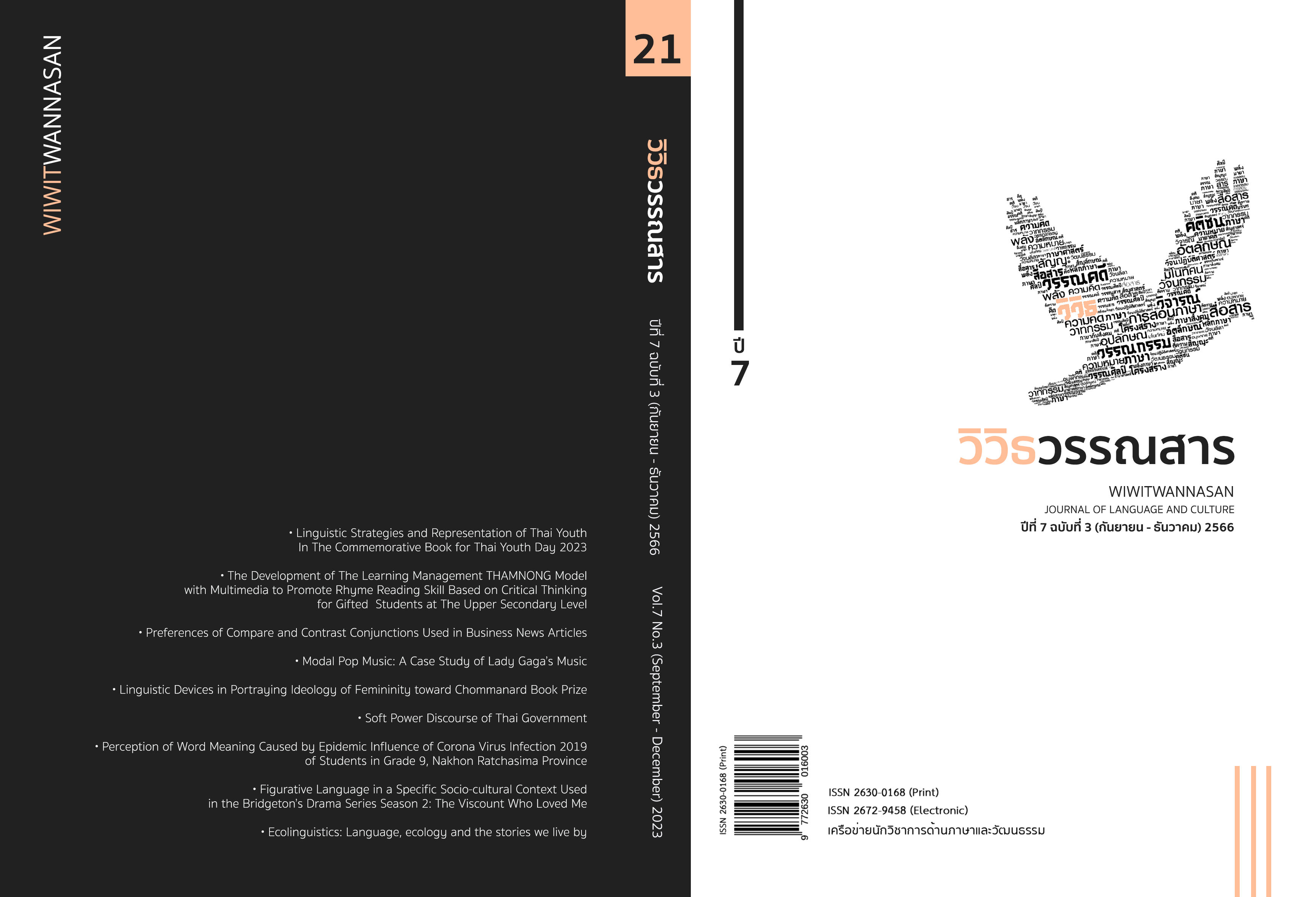การรับรู้ความหมายของคำที่เกิดจากอิทธิพลการแพร่ระบาดของโรคติดเชื้อ ไวรัสโคโรนา 2019 ของนักเรียนชั้นมัธยมศึกษาปีที่ 3 จังหวัดนครราชสีมา
Main Article Content
บทคัดย่อ
การวิจัยมีวัตถุประสงค์ 1. เพื่อศึกษาการรับรู้ความหมายของคำที่เกิดจากอิทธิพลการแพร่ระบาดของโรคติดเชื้อไวรัสโคโรนา 2019 และ 2. เพื่อเปรียบเทียบการรับรู้ความหมายของคำที่เกิดจากอิทธิพลการแพร่ระบาดโรคติดเชื้อไวรัสโคโรนา 2019 ของนักเรียนที่เคยและนักเรียนที่ไม่เคยติดเชื้อไวรัสโคโรนา 2019 กลุ่มตัวอย่างในการวิจัย ได้แก่ นักเรียนชั้นมัธยมศึกษาปีที่ 3 ปีการศึกษา 2565 โรงเรียนในสังกัดสำนักงานเขตพื้นที่การศึกษามัธยมศึกษานครราชสีมาที่เป็นโรงเรียนศูนย์ประสานงานเครือข่ายวิชาการ จำนวน 5 โรงเรียน โดยใช้วิธีการเลือกแบบเจาะจง เครื่องมือที่ใช้ในการวิจัย ได้แก่ แบบทดสอบการรับรู้ความหมายของคำที่เกิดจากอิทธิพลการแพร่ระบาดของโรคติดเชื้อไวรัสโคโรนา 2019 โดยการเก็บข้อมูลจากแบบทดสอบจำนวน 60 ข้อ เพื่อวัดการรับรู้ของนักเรียนจากคำศัพท์ จำนวน 30 คำ ทั้งเชิงความหมายและเชิงสังคมที่เกิดขึ้นจากอิทธิพลการแพร่ระบาด จากนั้น
นำข้อมูลวิเคราะห์ค่าเฉลี่ยและร้อยละ
ผลการวิจัย พบว่า 1. นักเรียนมีระดับการรับรู้คำที่เกิดจากอิทธิพลการแพร่ระบาดโรคติดเชื้อไวรัสโคโรนา 2019 2 ระดับ คือ รับรู้ในระดับมากที่สุด จำนวน 27 คำ คิดเป็นร้อยละ 90.00 และรับรู้ในระดับมากจำนวน 27 คำ คิดเป็นร้อยละ 10.00 และ 2. การเปรียบเทียบการรับรู้ความหมายของคำ
ของนักเรียนที่เคยและนักเรียนที่ไม่เคยติดเชื้อไวรัสโคโรนา 2019 พบว่า นักเรียนที่มีประวัติการติดเชื้อไวรัสโคโรนา 2019 มีการรับรู้คำที่เกิดจากอิทธิพลการแพร่ระบาดมากกว่านักเรียนที่ไม่มีประวัติการติดเชื้อไวรัสโคโรนา 2019
Article Details

อนุญาตภายใต้เงื่อนไข Creative Commons Attribution-NonCommercial-NoDerivatives 4.0 International License.
ลิขสิทธิ์ของบทความเป็นของวารสาร การพิมพ์ซ้ำจะต้องได้ร้บการอนุญาตจากบรรณาธิการวารสาร
เอกสารอ้างอิง
Banduwon, N. (2017). The Use of Foreign Words in Thai Language (Master’s thesis).
Bangkok: University of the Thai Chamber of Commerce. (In Thai)
Benchamas, J. & Padchasuwan, N. (2020). Factors related to Covid-19 Preventive Behavior
among Secondary Students Kalasinpittayasan School Muang District Kalasin Province.
Journal of Health Research and Development Nakhon Ratchasima, 7 (2),98-115. (In Thai)
Center for Situation Administration on the Outbreak of Coronavirus Disease 2019 (COVID-19).
(2020). Official document. Retrieved from https://sites.google.com/a/
mattayom31.go.th/site_2014/rongreiyn-ni-sangkad. (In Thai)
Changjai, N. (2022). Evolution of the Thai language. Bangkok: Ramkhamhaeng University Press. (In Thai)
Chewawiwat, N. (2020). COVID-19 Epidemic of Century. Bangkok: Matichon. (In Thai)
Chokkhanchitchai, S. (2020). COVID-19: New Wave of Outbreaks in Thailand 2020.
Journal of Preventive Medicine Association of Thailand, 10 (3), E-F.
Chuenklang, P. (2020). Consumers’ Perception, Attitude and Purchasing Intention Toward
Products and Services of Accommodation Business During Covid-19 Pandemic
(Master’s thesis). Bangkok: Chulalongkorn University. (In Thai)
Declaration of an Emergency Situation. (2020, March 25). Royal Thai Government Gazette.
Vol. 137, Pt. 69 (Special Issue),1.
Department of Health. (2020). A practical guide for educational institutions to prevent the spread of COVID-19. Nonthaburi: Q-Advertising. (In Thai)
Faculty of Medicine Ramathibodi Hospital, Mahidol University. (2020). Basic knowledge
of COVID-19. Retrieved from https://phoubon.in.th/covid-19.pdf (In Thai)
Kapklon, P. (1976). Studying the Thai language using linguistic theory (2nded.). Bangkok : Thai Watthanaphanit. (In Thai)
Khanitthanan, W. (1990). Language and Linguistics (5th ed]. Bangkok: Thammasat University Press. (in Thai)
Kotler, P. (2003). Marketing management (11th ed.). NJ: Prentice- hall.
Kuha, A. (2013). Psychology for daily life (2nd ed.). Pattani: Prince of Songkla University. (In Thai)
Ministry of Education. (2022). Criteria for opening a school or educational institution
According to the regulations issued in accordance with Section 9 of the Royal Decree.
Public Administration in Emergency Situations 2005 (Issue 37). Retrieved from
https://www.moe.go.th/360rules-for-opening-schools. (In Thai)
Nueangkorat, Y. (2015). Foundation to Psychology. Bangkok: Odeon store. (In Thai)
Office of the National Education Commission. (2002). Guidelines for assessing quality
according to basic education standards. Bangkok: Agricultural Cooperative Printing Demonstrations of Thai. (In Thai)
Pancharoen, A. (2018). Influences of Foreign Languages on Thai (4th ed.). Bangkok:
Ramkhamhaeng University Press. (in Thai)
Pawangkanan, T. (2022). Educational Administration in the Covid-19 Outbreak Situation in
New Normal Living. Journal of Bovorn Multi-Education and Human Social
Sciences, 2 (2), 25-32. (In Thai)
Punnotok, T. (2020). Evolution of Thai language and Thai letters. Bangkok:
Chulalongkorn University Press. (In Thai)
Phawakanan, U. (2013). General psychology (7th ed.). Bangkok: Thammasat University
Press. (In Thai)
Phoukert, S. (1995). Social psychology. Bangkok: ICT Center Sripatum University. (In Thai)
Sariwat, L. (2002). Mental hygiene and adjustment. Bangkok: Odeon store. (In Thai)
Sonda, J. (2014). Tourism Image and Perception of Marketing Public Relation Affecting
Thai Tourists’ Revisiting Chanthaburi Province (Master’s thesis). Bangkok: Bangkok
University. (In Thai)
Sripairoj, K. (2020). Media Exposure, Perception, Knowledge, and Behaviors in Health
Protection on Pandemic for Junior High School Students: case of Covid-19
(Master’s thesis). Chulalongkorn University. (In Thai)
Suwanasaeng, K. (1989). General psychology. Bangkok: Akson phitthaya. (in Thai)
The Secondary Educational Service Area Office, Nakhon Ratchasima. (2013). Affiliated
schools. Retrieved https://sites.google.com/a/mattayom31.go.th/site_2014/
(In Thai)
Thonglor, K. (2000). Grammar of Thai Language (11th ed.). Bangkok: Ruamsarn.
(In Thai)
Tangkittipaphon, J. (2013). General psychology. Bangkok: Chulalongkorn University Press.
(In Thai)
Waranusantikun, S. (1981). Social Psychology. Bangkok: Krungsiam. (In Thai)
Wattanaburanon, A., Sirichote, M., Piyaaramwong P., & Sattayathewa S. (2022). Perceptions
and Preventive Behaviors of the COVID-19 among High School Students in Bangkok,
Thailand. Journal of Liberal Arts, Maejo University, 9 (1), 36-49. (In Thai)


